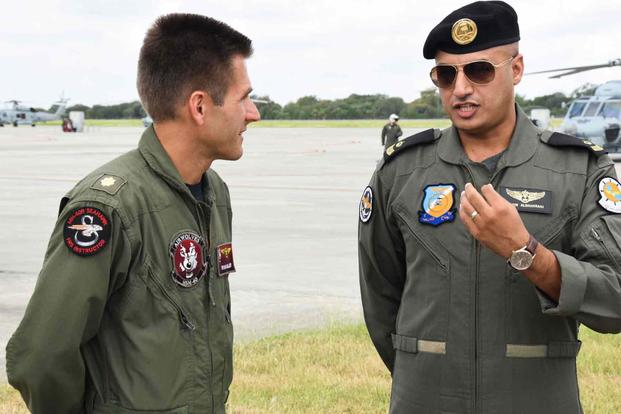Service members from Saudi Arabia are back to conducting flight training in the U.S. nearly three months after it was halted following a fatal terror attack on a Florida military base.
Saudi international military students resumed flight training Tuesday, Navy officials announced. The move follows a host of new restrictions placed on foreign troops, limiting their access to Navy and Marine Corps bases and banning them from having personal firearms while they're in the U.S.
The Navy will continue reviewing its policies for training foreign troops, Lt. Cmdr. Megan Isaac, a Navy spokeswoman at the Pentagon, said in a statement Wednesday.
"The Navy is making every effort to minimize disruptions to our foreign national partners while implementing the revised security initiatives," she added.
Related: Navy and Marine Corps to Ban Personal Firearms for Foreign Troops
The services were ordered to review their policies on foreign military trainees after a 21-year-old member of the Royal Saudi Air Force brought a weapon that he purchased lawfully in Florida onto Naval Air Station Pensacola. Three sailors were killed and several more wounded when he opened fire on a classroom there.
The Pentagon announced it would pause all operational training for 850 Saudi troops on Dec. 10, four days after the attack. Since then, Saudi troops have participated only in classroom training.
The FBI determined the December shooting was an act of terrorism after finding evidence the Saudi officer, who was killed by law enforcement agents, had been inspired by foreign jihadist ideology. The investigation led to 21 other Saudi students being booted out of the U.S. after federal agents found anti-American materials or child pornography images on their computers.
Navy officials did not immediately respond to questions about how many Saudi troops are still training on U.S. bases and how many of them are assigned to Pensacola. In her statement, Isaac said training with international service members helps strengthen alliances and build partnership.
"Foreign military training remains one of the most effective tools to advance U.S. national security," she said.
All foreign troops training with the Navy and Marine Corps, regardless of country, must now sign agreements saying they won't carry, purchase or possess personal weapons or ammunition while assigned to American military bases.
The Saudi officer was able to buy the semiautomatic handgun used in the attack through a hunting license loophole.
Foreign troops are also limited to accessing only the base for which they have orders, according to new Navy and Marine Corps policies issued this month. The Marine Corps, in response to the Pensacola attack, also gave about 3,000 law enforcement personnel the OK to carry personal firearms, even when they aren't on duty.
-- Gina Harkins can be reached at gina.harkins@military.com. Follow her on Twitter @ginaaharkins.
Read more: Pensacola Heroes: How 2 Marines and an Injured Sailor Saved Lives During Mass Shooting












